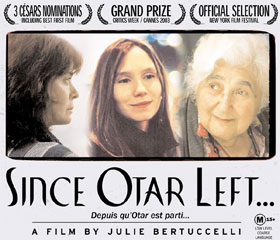
Winner of the prestigious Critics' Week Grand Prize at the Cannes Film Festival and featuring a trio of stunning performances, Julie Bertuccelli's exquisite SINCE OTAR LEFT... is a bittersweet tale of deception and affection.
Three Georgian women--strong-willed matriarch Eka (90-year-old former dental assistant and fledgling star Esther Gorintin), her long-suffering daughter Marina (Nino Khomassouridze) and rebellious granddaughter Ada (Freeze, Die, Come to Life's Dinara Droukarova)--all live together in their stately-yet-crumbling apartment in contemporary Tbilisi, the capital of the former Soviet republic. Eka pines for her beloved son Otar, a physician who is now a construction worker in Paris. Marina is deeply resentful of her mother's obsession with her absent brother, while Ada endures their bickering and yearns for a more adventurous existence. When a friend of Otar's calls with tragic news, Marina and Ada must make a seemingly impossible choice: Do they keep Eka from learning the truth?
Former assistant director to Bertrand Tavernier and Krzysztof Kieslowski, Bertuccelli deftly spins the delicate threads of familial conflict and maternal love into a bewitching tangle of intergenerational duplicity.
Director: Julie Bertuccelli
Screenplay by Julie Bertuccelli and Bernard Renucci
Adapted by Roger Bohbot
Cinematography Christophe Pollock
CAST
- Eka ... Esther Gorintin
- Marina ... Nino Khomassouridze
- Ada ... Dinara Droukarova
- Tenguiz ... Temour Kalandadze
- Roussiko ... Roussoudan Bolkvadze
- Alexo ... Sacha Sarichvili
- Niko ... Douta Skhirtladze

"Julie Bertuccelli's very beautiful first feature is suffused with indelible humanist values and emotions."
David Stratton - VARIETY
"Since Otar Left sustains a perfect balance of pathos, humour and a clear-headed realism."
Stephen Holden, NEW YORK TIMES
" Julie Betuccelli's simple but sublime debut feature presents a portrait of maternal love and female fortitude that will reduce the stoniest of viewers to tears."
Frank Scheck, HOLLYWOOD REPORTER

Since Otar Left is the first feature from documentary filmmaker Julie Bertuccelli.
It is a subtle story of a lie for love that changes the lives of three women of three different generations.
The deserving winner of the grand prize in the International Critics Week at Cannes in 2003, Since Otar Left (Depuis qu'Otar est parti) is an exquisitely bittersweet drama set in Tbilisi, the crumbling capital of the post-Soviet republic of Georgia. Three generations of women - the stoically beautiful Ada (Dinara Droukarova), her lusty mother Marina (Nino Khomassouridze) and whip smart grandmother Eka (Esther Gorintin) - live together in a book-filled apartment. When news comes that Marina's brother Otar has been killed on the job in France, Marina and Ada decide to conceal his death rather than break Eka's heart. Yet their lie soon spawns larger and larger ones.
Wise and perfectly judged, this feature debut hits all the right marks. Though it has some wonderfully comic moments, for women especially, this film aims directly at the heart.
Julie Bertuccelli's Since Otar Left is a tale of three women, three generations of a Georgian family living in a crumbling milieu in which everyone seems to be eking out a living, and prosperity and comfort reside somewhere else.
The details of daily life, of how people scrape to get by, are central to the story and the film is also a welcome portrait of three strong-willed women inextricably linked to one another, however uncomfortably.
Eka (Esther Gorintin) is 90, sustained by benign memories of the past under Stalin and her hopes for the future of her beloved son, the absent Otar, who has gone to Paris to earn a living: he is doing odd jobs, and sends money and postcards, supplemented by the occasional phone call.
While the son is away, a put-upon daughter remains at home. The household is made up of Eka's other child, the volatile and often resentful Marina (Nino Khomassouridze) and Marina's student daughter Ada (Dinara Droukarova).
When Marina receives bad news about Otar, she decides to conceal this from Eka: the two women become involved in an extended, loving deception that becomes more and more difficult to sustain.
Rather than keeping Eka happy, they contrive to make her more restless and determined to act.
This plot element - the well-intentioned charade that goes awry - is not in itself particularly original: what makes the film memorable is the way it arises so naturally out of the three delicately observed central performances, the layers of domestic detail and a strong sense of place.
Gorintin, who was memorable in Emmanuel Finkiel's Voyages, is sharp and touching as Eka, a formidable figure who insists that her family speaks French to her (Ada reads Proust to her while massaging her feet). Eka springs several surprises on her family in the course of this graceful, carefully attentive movie.
* * * 1/2
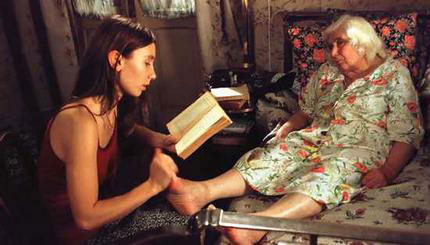
Ada reads Proust to Eka
An interview with director Julie Bertuccelli
Your background is in documentary filmmaking. Is the manner in which you seize on a gesture or a look to communicate characters' feelings and their common outlook something which you get from your experience with documentaries?
Maybe. What I love about documentaries is that the people one films invent their own scenes without one's having to ask them to do so. One chooses one's characters, determines the shooting-conditions, the right manner and the right sense of distance, then one simply watches and follows them, presents them as best one can and trusts in one's own eyes. I suppose I wanted to go on working with this freedom, only applying to a dramatic situation. Having said which, in my documentary work, I never intrude on people's private lives. I merely film people-often at work-and if the job is well done, then a sense of intimacy appears in their faces, in their attitudes and their way of speaking and in the silences between words. My interest in fiction sprang out of a need to go push my limits and find a different way of filming characters.
The main difference between drama and documentary is that in drama there are actors
True, but at the start my intentions were not so very different. I shot my actors with the same curiosity that I shoot people in my documentaries, except that I was less afraid that I might be manipulating them, that I might be transgressing the taboo on intimacy. Indeed, with Since Otar Left, when I sensed that an actor was acting as such, all the emotion was gone. I enjoyed shooting written dialogue, but I have to say I was very suspicious. I was afraid it would sound fake.
How did this, your first feature, come about?
Since Otar Left is based on a true story that I was told. It was true but it seemed so unlikely that it made me want to appropriate it. And in any case, it was a story that could not be told as a documentary-it was much too intimate. That's why I had to embark on a new kind of storytelling. And of course we changed everything, reinventing the story, the end, the characters
How was the project developed?
I told executive producer YaŽl Fogiel about my idea and we found some money for the script to be written. Bernard Renucci, a screenwriter I have often worked with in my documentaries, wrote the first three or four drafts in close collaboration with the producer and with myself. Then when we obtained the French government's grant aid, I rewrote the script alone, then with Roger Bohbot to bring the story closer to me, adapting and restructuring it.
Why the Republic of Georgia?
I spent six months in Georgia working on a film by Otar Iosseliani and I fell in love with the place, as I had earlier fallen in love with Iosseliani's films. It's a very attractive country, a crossroad between Europe and Asia, with Caucasian and Russian and European and Middle Eastern influences. You sense all that when you go to Tbilisi, it is a magnificent town, despite its dilapidated condition. Things are less harsh there than in Russia. People are warmer. I felt very at home. Perhaps because I come from the Mediterranean.
Georgian history is fairly chaotic, they've had all sorts of problems, but they tend to preserve the best of what they've got. I fell in love with Georgia as a place but I did not particularly decide that I would make a film there. Then when this story came up, I knew it would have to be made there. Primarily because the plot would give us a pretext to show this fascinating place. And also because I wanted to say something about France -not France seen from the inside, France seen from elsewhere. I wanted to deal in foreign imaginations, to show the discrepancies that occur. I wanted to make a film a long way from home and use the distance to say something about myself, in other people's eyes.
Why is it that Ada's family is so in love with France?
Georgia is a land which has a long tradition of links with France, though they are not well known. Many French people have travelled there and many indeed have settled there. There has been a constant process of exchange. Georgians are fascinated by French culture. Many people within the Russian sphere of influence are. All the same, I don't feel that this is a film about Francophilia. I am not interested in talking about France so much as in talking about how one comes to fall in love with a foreign land one knows only from one's imagination, with all the potential for disillusionment that that contains.
Still, the heart of the film is in its portrayal of three generations of women
Yes, the idea was to show a triple relationship between three women caught in a changing world, sometimes changing for the better, sometimes for the worse. I wanted Eka, Marina and Ada to be equally important, I did not want one part to eclipse the others. You could say that they are all three aspects of one and the same character, the same woman at three different stages in life. And then of course this family is a manless family. Men are rejected, put aside. In Georgia, when men are unable to provide, women take on that responsibility. Otar is not the only man to have gone away. Ada's father is also mentioned as having died in Afghanistan. Perhaps he was Russian; one does not know. As I come from a fairly matriarchal world, I was able to project a great deal of myself into this and introduce a mother-daughter theme. The strength of the mother-daughter relationship is what has made me, in a good sense and in perhaps in a destructive sense too.
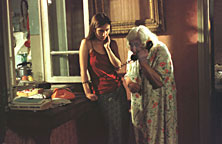
Dinara Droukarova as Ada
and
Esther Gorintin as Eka
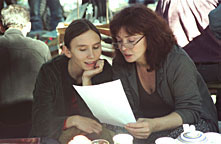
Dinara Droukarova as Ada and
Nino Khomassouridze as Marina
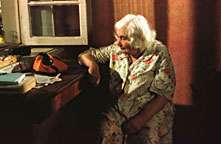
Esther Gorintin as Eka
The story opens with a silent scene about a cake. Not a word is said and yet one immediately understands the connections between these women
The opening scene was not in the screenplay, it was totally improvised. There was just a need to see the three of them together in silence, one Sunday. They go out for a bit, they are bored, they have nothing to do and nothing to say to each other. It was our last day of shooting in Georgia. I hardly had to direct the scene, the actors knew their parts well.
How did you cast the film?
There is a major theatrical tradition in Georgia. My first notion was to find three Georgian women. In the end the only Georgian actor was Nino Khomassouridze who plays Marina. Nino is an impressive woman-she is very sensuous, very beautiful. And the incredible thing is that I eventually discovered that she herself had lived through something similar to what is in the film, something tragic.
The casting director, Stephane Batut, searched both France and Georgia to find the right Ada. It was not long before we were out looking for non-professional actors. We saw dozens of Georgian girls who spoke French, but we did not find that perfect person we wanted. We spread our net wider and went to Russia, as Russian is widely spoken in Georgia, and I was soon introduced to Dinara Droukarova who lives in Paris now. People may remember her from Kanevsky's Freeze, Die, Come to Life which is one of my favorite films. And because it is one of my favorite films I was very moved to meet Dinara. She is Russian but of Mongolian extraction. Originally in the screenplay, Ada found her womanhood a problem. She was really a 25-year-old teenager, harsh and overweight and uncomfortable with herself. Dinara is so attractive that I had to adapt the story to fit her slim body. In the end, her discontent is communicated by the fact that she looks different, she looks stubborn and over-intense.
What about Eka, the grandmother?
I loved Esther Gorintin in Voyages, Emmanuel Finkiel's magnificent film. But I was worried that people would make a connection if I cast her. And also, I would have preferred to have found a Georgian Francophile to play the part, who would not have appeared in any other film. In the end, however, after searching high and low and meeting some incredible people, Esther obviously seemed right. She is a remarkable actress. She is also 90 years old. It was not easy for her to go to Georgia for two months and shoot a film. But she was amazing. Her concentration was remarkable, she was professional, she was tireless. She loved the place and enjoyed the food so much she put on twelve pounds.
Did you rehearse?
We did a few readings, but not too many. There were language problems: French, Russian, Georgian. Esther spoke Russian and French but Dinara needed to learn Georgian and Marina was not too keen on speaking Russian, because to her it's the language of oppression. The main advantage of rehearsing was to establish who would speak what language and at what time. And for me it was useful to be able to observe my actresses. I did not want to have to psychologize things, nor give overprecise directions. I needed to watch them, to find details in their behaviour that suited the characters and vice-versa. Some people have a particular way of tidying a desk or cleaning a room before they sit down to work. My need was to see real people and places, to smell locations, details, the whole concrete business of pre-production.

Julie Bertuccelli rehearsing Since Otar Left with Esther Gorintin
Is your film a film about lying?
Yes and no. Of course, there is lying at every level and those lies generate more lying. As a concept, lying is fascinating. It's a great place to set a film because it is a twin force, both destructive and creative. But in this story, lying is really a catalyst that shows family precedent, that reveals how each of the women lives a lie and especially how each of them changes their lives to fit this lie. I am a great liar myself-at least, I enjoy the wealth of possibilities, the ambivalence involved in playing games with reality-so I was not about to cast moral aspersions on lying: I wanted to show it as a fact. Lying is not a question of principle; it springs from an excess of heart and is not something I wanted to treat judgementally. It is no more than a slightly neurotic, slightly mad way of inventing a life for oneself, of making one's life more bearable and also perhaps a way of manipulating people and allowing oneself to be manipulated by them. In Since Otar Left, everyone has something to gain from the central lie.
Your interest in reality did not prevent you writing a dramatic story.
That was one of the problems in writing and also in editing. As time passed and as the women's lie was accepted, there was a danger that we might fall into a conventional story with surprises and suspense. We didn't want to have 40 billion double-entendre scenes which would have turned the whole thing into a comedy. We want the story to get off on the wrong foot as it were, never to be where one would expect it to be, to hobble along but always get by. And in the cutting room, with Emmanuelle Castro, the editor, we muddled things up even more.
Nevertheless, one is gripped by this story about lying and the consequences of lying, one does want to know how it is all going to end.
We knew we had to stick as close to these women as possible and to the main strand, which was "What are they going to do with this lie now that it has landed in their lives?" The mother, for instance, carries the whole thing like a burden-a duty really-then gradually it brings her a kind of calm. There is a new tenderness between her and her mother, their relationship is more relaxed. And with Ada, our main concern was to see how she might blossom and become herself because of this lie, how she might enjoy it and start to live vicariously, how she might learn to be selfish. Ada really makes the lie credible, she is the one who writes and can transform things. And in the end when she leaves, it is not because of anything which she herself has done. That is one of the things which touches me most, seeing how people create life under constraint, more often than not out of nothing much more than a few bits of broken this-and-that.
Is this true of the grandmother?
Yes. And in the end the grandmother is the most energetic of all three characters precisely because she has the power to make life. Her attitude is that at any moment, everything can be called into question, you can change direction, you don't need a fixed plan. The beautiful thing is how each one of the characters' lives is transfigured. I hate locking people up in fixed frames. I've made films about gravediggers, about a man leaving prison, about a government law school, about a department store, about corporate bosses in a merger. And in every case I've encountered people who prove prejudice wrong.
In your film, you do show that the mother's generation is a lost generation.
Marina's generation is probably the generation to have coped with the end of the Soviet Union least well. Marina has been hit hard by change. She is a product of the past, yet she belongs fully to the present with its violence. She is cut in two by this gap in history. She is condemned to know that her daughter must dream of leaving, she is condemned to finding herself abandoned.
The photograph of Marina with a gun to her head tells us a lot about her past, her quiet strength.
It's a genuine photograph of Nino Khomassouridze. I went to the actors' homes to find photographs of themselves and I was fascinated to find this. Nino is someone very complex and the picture is symbolic. It says that this woman has always been apart and it also says this woman is so strong that she can deal with that, just as Marina was trained as an engineer and finds herself selling junk in a flea market. Marina cannot breakdown. That's strong characters' weak point.
And Eka, who is sometimes like a little girl, she is complex too.
Eka comes from an educated family, but when it suits her she says she loves Stalin. She remains very keen on her appearance and as soon as she's alone, she grabs an opportunity for a cigarette. Characters don't alter as they grow older, they only accumulate more material, becoming more interesting as they acquire overlapping contradictions. I met many people like that in Georgia, people who loved reading in French and French literature, and though they didn't exactly miss Stalin, they did say things were better before. Those are contradictions I find interesting. I didn't want simplistic characters.
What gives life to the film is its shifting between two themes: the need to transmit, and the need to repeat
Transmission is indeed one of the themes in the screenplay. Obviously, when one is dealing with a family, the idea of things being handed down from one generation to the next occurs, as does the idea that errors and defects are passed on, sometimes along with a need to make one's own way in life. The idea that we are all constrained by the example of others is a very cinematographic idea. When one is filming, the unconscious speaks. Mysterious and intangible things, secrets even, come to the surface and seem evident once they are revealed.
I believe that the relationship between grandmother and granddaughter is a way of getting round a difficult relationship with one's parents, a way of finding another path to avoid getting locked up in an endless war between mother and daughter. People both want and don't want their children to leave home. The end-credit song says, in Georgian, "Butterfly fly away, Butterfly do not fly away"
What role does Otar's example play in all this?
It's such a remote example that it is difficult for any of them to pursue it. They don't really. I suppose that in the end the grandmother follows his example most faithfully because she has the least to lose and because despite appearances she is extremely generous. Perhaps she has known what has happened or guessed it for a long time, and she only wants to encourage her granddaughter to leave for the far-off place she dreams of. Maybe she wants to help her granddaughter accomplish what she herself has never been able to do.
There is a strong physical quality to the relationship between these women. They embrace, they rub each other's feet, they wash each other's hair...
This is the way I see family relationships, and in terms of form, it translates into a taste for filming people's physique which is expressive but not explanatory. A foot being rubbed tells one a great deal about the character involved, about that person's relationship to other people. The women in my film give each other love and tenderness, though not enough perhaps and perhaps not of the right kind. Because it is also true that Marina is still asking her mother to love her. She cannot really grow up and be a proper mother herself. So Ada plays the mother's role. That's one of the things she finds stifling.
These three women share an apartment, but once again it is not the lack of breathing space which you show us, but the life going on irrepressibly.
In the original screenplay, the story was set in a project-type apartment, in a modern neighborhood that was already falling to pieces. Such places exist-they're impressive because so they're so totally anarchic. There are doors out on to a balcony with no balcony there, such as one sees in the apartment of Tenguiz, Marina's boyfriend. But if we'd set the film in such a place, then it would have turned into social realism and I didn't want all that social comment to outweigh the rest. And my heart led me to an old-fashioned apartment, despite the fact that I was a little afraid of making things seem too beautiful. The apartment we used as a location is a lovely one, but it is not really a wealthy person's apartment. It's only "wealthy" because the people who live there invest it with so much.
There's also the whole courtyard life and the little garden where the grandmother goes out to work.
Courtyards in Georgia are amazing. There's a real sense of community in the way people use the courtyards, with the kitchens set out on the balconies, above. Families remain close-knit; grandparents, parents and children all living together. Today, you find 25 year-olds still living with their grandmothers. To us it seems magical, living with one's grandmother like that, and it makes for living arrangements which we no longer have in our countries. But of course it creates neuroses too. Georgians have no choice and living with one's family increases the burden of social disapproval. This is what stifles Ada and encourages her to want to leave. She needs to discover a new and different world. In Georgia, whole generations have been locked in with their families, so there is a real appetite for life, an appetite for novelty. People emigrate for lack of work but for other reasons as well: for love, to fulfil a dream, to meet new people, out of curiosity, to get away from family neuroses. There are a whole host of reasons and I wanted to get away from social realist caricature in which themes of emigration often induce.
The second scene in the film is a long scene in the post office. Was that a way of introducing letters as an important element in the film early on?
I am very attached to this scene. It's the first scene I thought of and the first scene I shot. The images are documentary images and I am very fond of them. They represent my way of showing letters, as well as also the absolute dilapidation of an unusual country, which remains cheerful, where people go on living and having fun despite all the problems. As a documentary filmmaker, I always like showing people making the most of what they've got to make a life for themselves.
The cinematography helps generate a sense that life always wins out.
There is something fascinating about having to deal with blackness, with night, with candlelight. The locations were very beautiful and Christophe Pollock, the DP, came out to Georgia early to make the most of them. We wanted the locations to come to life almost physically. We absorbed as much of the atmosphere of the country as we could, the gentleness and the complication of it. I am very attached to the locations that are shown. I found places I liked, but they were not to be seen as picturesque, as a catalogue of beauty spots. I wanted the story to have universal resonance, a story that happened to be located in Georgia but which might just as easily have taken place elsewhere.
And the wishing tree? Does that exist in real life?
Yes, it does. It did not appear in the early drafts of the screenplay and we came across it with the screenwriter on our very first reconnaissance. There are trees all over the place, often near churches. It's an old pagan custom which I find moving. It makes reality breathe. Even if you don't believe in what is behind wishing trees, the gesture itself-tying a ribbon to the branch of a tree-is a tradition. It is very moving. There is a lot to those ribbons. They tell us something universal, they tell us that people's desires and sorrows and hopes are common to all mankind.
© 2004 Zeitgeist Films Ltd.